On 14 Febuary, Valentine’s Day, the day of love, the spotlight will be trained on Abu Dhabi: the BAPS Hindu temple is all set for its grand opening, and the Indian Prime Minister Narendra Modi will be in the city to inaugurate a testament of faith that will lay the grounds to further deepen the already-rich Indo-UAE friendship. For Indians, who comprise close to 38 per cent of the total population of the UAE, this is affirmation of the highest order, a dream meticulously crafted into a sandstone reality by the ruling dispensation of the country, led by HH Sheikh Mohamed bin Zayed Al Nahyan, President of the UAE.
NRIFocus caught up with a bunch of NRIs in the UAE to find out how they feel about this historic occasion.
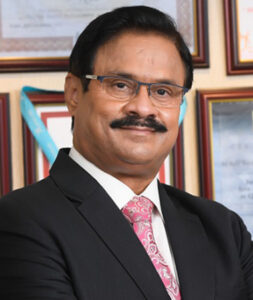 ‘The temple will stand tall as a testament of the shared values between India and the UAE’ — Dr Dhananjay Datar
‘The temple will stand tall as a testament of the shared values between India and the UAE’ — Dr Dhananjay Datar
Dr Dhananjay Datar is chairman and managing director of Al Adil Trading Company — a UAE-born brand that has supermarkets all across the GCC and in India. According to the company website, Al Adil “knows the pulse of the expatriate Indian community, having mastered the art of sourcing the right products to its customers at the right time, be it a favourite brand or pickle or papad, or the rarest of herbs and spices”. Little wonder that Dr Datar is popularly referred to as the ‘Spice King’ in the UAE. Speaking exclusively with NRIFocus, Dr Datar sounded enthusiastic about the inauguration of the Abu Dhabi temple, pointing out that it “marks a pivotal moment in the cultural landscape, reflecting the commitment of both nations towards building bridges and celebrating diversity”. “The temple underscores the significance of Indo-UAE relations, the collaborative efforts between the two governments… and their active involvement in making this cultural landmark a reality.” Alongside, the temple will also be viewed as a symbol of inter-faith harmony, “fostering unity among diverse communities”. “It will stand tall as a testament of the shared values and mutual respect between India and the UAE. This initiative will strengthen diplomatic ties, while contributing to a much-needed narrative of peaceful coexistence.”
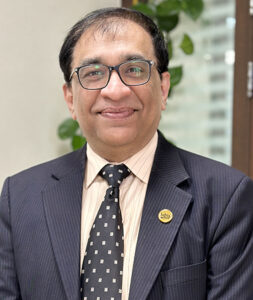 ‘The temple’s architecture reflects the deep interweaving of our [UAE and India] cultures’ — Bharat Chachara
‘The temple’s architecture reflects the deep interweaving of our [UAE and India] cultures’ — Bharat Chachara
Bharat Chachara is the current CEO of India Club, Dubai, and has been driving the largest Indian social institute in the emirate, fostering dreams and aspirations of the vibrant Indian community. As a third-generation Indian, his roots run deep in the Arabian Gulf, with his family having been residents of the UAE since 1952. Mr Chachara points out that the BAPS temple serves as a metaphor for the enduring Indo-UAE business relationship, much like the temple itself which was a long-awaited idea that is now coming to fruition. “Just as businesses between India and the UAE have thrived over the last two centuries, the temple’s architecture reflects the deep interweaving of our cultures. The intricate carvings within the temple symbolise the interconnectedness of the Indo-UAE business corridor, illustrating a harmonious collaboration.” The temple, he says, will be a testament to the strong foundation and shared values between the two nations, creating an environment favourable to the flourishing of business partnerships. “Just as devotees unite within the temple, businesses come together, promoting a dynamic and prosperous relationship that goes beyond borders.”
Significantly, the temple is an exemplification of the UAE’s commitment to interfaith harmony and tolerance. “The very architecture of the temple mirrors the intertwining of cultures, with the seven spires symbolizing the unity of the seven emirates. The intricate carvings, featuring camels and falcons, represent a deep respect for local traditions and wildlife. This harmonious blend of elements showcases the UAE’s dedication to embracing diverse cultures and religions, creating a space where people from all walks of life can come together in unity and understanding.”
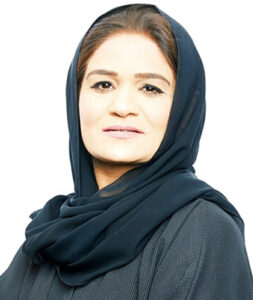 ‘It’s UAE’s message of tolerance, acceptance, and togetherness’ — Juhi Yasmeen Khan
‘It’s UAE’s message of tolerance, acceptance, and togetherness’ — Juhi Yasmeen Khan
Juhi Yasmeen Khan is an award-winning humanitarian, a CSR expert, a social leader and mentor and an entrepreneur who founded JYK Community Services, UAE, with an eye to make human lives matter. She also calls herself a “proud Indian”. Speaking to NRIFocus about her thoughts on the Hindu temple in Abu Dhabi, she says, “It’s wonderful to see the amazing strides being taken by the UAE government to build on its already long-running commitment to diversity, especially when it comes to those of the South Asian diaspora… Even though I am not a Hindu, seeing how happy other fellow Indians are at the prospect of experiencing their culture, belief system and heritage [with the inauguration of the temple] is warming my heart. It’s through efforts like these that our two great nations — India and the UAE — become stronger together, not only socio-politically but also harmoniously as different people with one vision: that of unity and hope. Also, it’s a beautiful message by the UAE to the world that Islam welcomes all religions and respects all religious beliefs and faiths. It’s UAE’s message of tolerance, acceptance, and togetherness.”
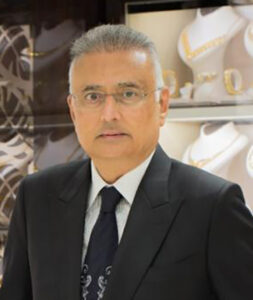 ‘The BAPS temple proves there is unity in diversity’ — Anil Dhanak
‘The BAPS temple proves there is unity in diversity’ — Anil Dhanak
Mr Anil Dhanak is MD of Kanz Jewels, one of the largest jewellery brands in the UAE; his family — one of the earliest settlers — has a 65-year-long history in the country. “Since my childhood, the UAE has been a harbinger of interfaith harmony… I recall being part of prayers at the Krishna and Shiva temples in Dubai. With the BAPS temple, the UAE — a country with residents from over 190 countries, living together harmoniously, proving there is indeed unity in diversity — is setting a new benchmark for peaceful coexistence. The temple is going become a tourist attraction, and there will, no doubt, be a positive impact on businesses, leading to economic growth.”
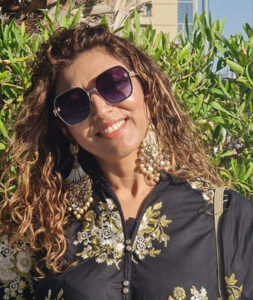 ‘The temple stands for peace, harmony and tolerance’ — Prerna Kalia
‘The temple stands for peace, harmony and tolerance’ — Prerna Kalia
Fashion designer, artist and yoga instructor Prerna Kalia moved to Dubai when she got married, 16 years ago. “The UAE is my home now, it’s an extremely progressive country, and I love its entrepreneurial zeal — which makes its residents very focused and driven. But what I love most about the UAE is how it’s never lets up on making expats feel comfortable. The temple in Jebel Ali marked a new chapter in the UAE-India relationship. And now with the Abu Dhabi temple — supposed to be one-of-its-kind — the UAE has reinstated its vision of inclusion: the temple stands for peace, harmony, and tolerance, while also being a symbol of brotherhood between the two nations… it shows how interconnected we are as we share the same values that unite humanity.” — Sushmita Bose is Managing Editor of nrifocus.com

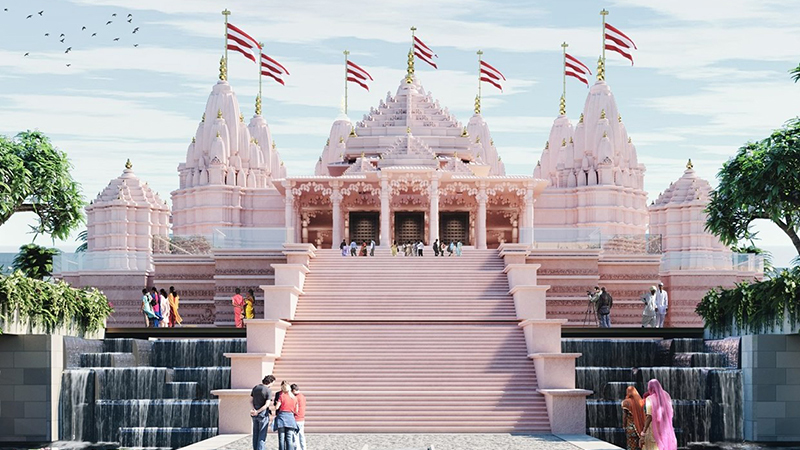
Leave a Reply